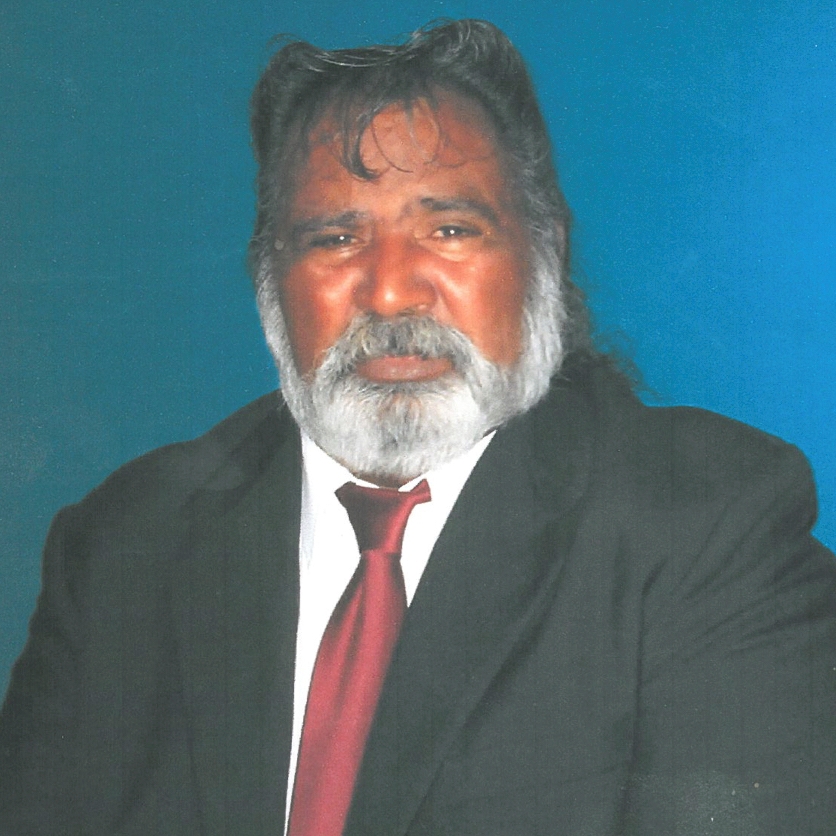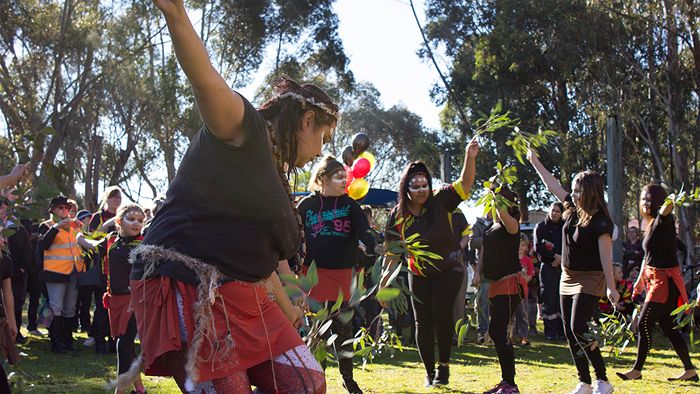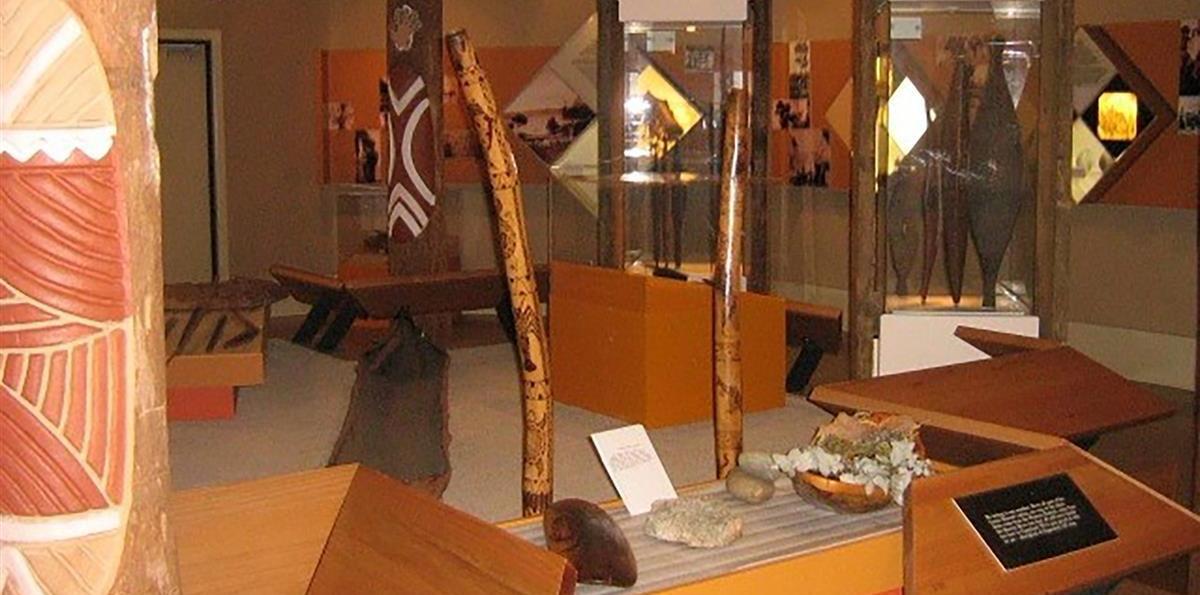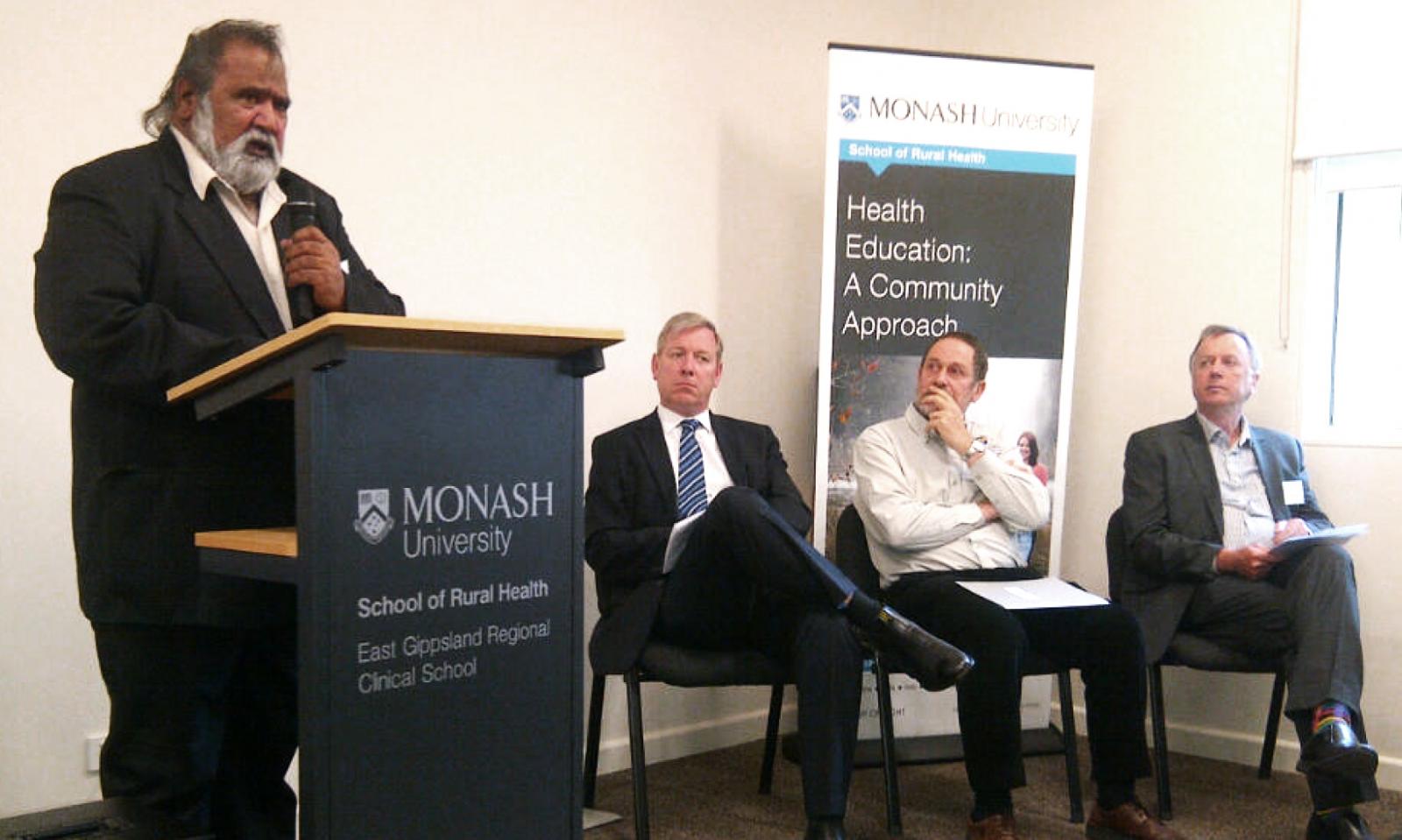Uncle Robert Pearce was a respected Aboriginal leader in Gippsland, whose life was fuelled by an ambition to bring about positive change in his community.
1947-2013. A leader who always led by example.

Affectionately known as Uncle Jumbo, he was a big man with a big heart and a role model who embodied persistence and hard work. Uncle Jumbo was born in Balranald, New South Wales, in 1947. His parents were Thomas Pearce and Violet (née Kirby), who had 10 children. When Uncle Jumbo was a boy, the family moved to the old Manatunga Mission at Robinvale. There they struggled to eke out a living among the tin dwellings and tents that housed people on the banks of the Murray River. When he was 9 years old, Uncle Jumbo was taken into care and placed with a non-Aboriginal foster family. The experience was never forgotten.
He was a big man with a big heart and a role model who embodied persistence and hard work.
As a teenager, Uncle Jumbo qualified as a roof tiler. In 1965 he met and married the love of his life, Marion Solomon. The couple moved to Bairnsdale in 1966, where they raised their 4 daughters. Over the years, Uncle Jumbo worked hard to provide for his family. At various times he was a plant operator for Victorian Railways, a seasonal picker, a fitter and turner and a gardener at Bairnsdale Hospital. He also had a job drilling for oil. Whether working or playing football on weekends, Uncle Jumbo's engaging personality always won him friends.


Uncle Jumbo joined together with other Aboriginal leaders in setting up an Aboriginal service. Through years of unpaid work, they eventually nurtured the organisation to success. It became Gippsland and East Gippsland Aboriginal Cooperative (GEGAC).
Gippsland and East Gippsland Aboriginal Cooperative
From the day they arrived in Bairnsdale, Uncle Jumbo and Marion helped those in the Aboriginal community who were unable to access basic services. Uncle Jumbo regularly volunteered to drive the sick to hospital and in the absence of any alternative, transported the bodies of those who had passed away. In 1972 he and Marion joined other local Aboriginal leaders such as Aunty Nessie Skuta in setting up a dedicated Aboriginal medical service. Through years of tireless unpaid work, they nurtured the fledgling organisation to success. It became the Gippsland and East Gippsland Aboriginal Cooperative (GEGAC) after its incorporation in 1975.
Uncle Jumbo regularly volunteered to drive the sick to hospital
A board member of GEGAC for more than 25 years, Uncle Jumbo contributed to the expansion of its range of services, including youth, sport and recreation programs. He strongly advocated for better education and employment opportunities for Aboriginal people and built partnerships with the local council and employers to create them. Today, GEGAC employs more than 100 people and has provided many more with a pathway to future employment.
He strongly advocated for better education and employment opportunities for Aboriginal people.
When sections of the Bairnsdale community objected to the location chosen for GEGAC's new premises in the 1980s, Uncle Jumbo led a successful 4 year campaign with other Elders to dispel misinformation and win public support. It was in this spirit that Uncle Jumbo later helped establish the Krowathunkooloong Keeping Place, believing in the need not only to preserve Aboriginal cultural heritage on country, but also to share it with future generations of Aboriginal and non-Aboriginal people.


Uncle Jumbo later helped establish the Krowathunkooloong Keeping Place, believing in the need not only to preserve Aboriginal cultural heritage on country, but also to share it with future generations of Aboriginal and non-Aboriginal people.
An Admired Problem Solver
Between 1985 and 1988, the Victorian Government employed Uncle Jumbo as a community development worker. He was well known across East Gippsland and admired for his ability to solve problems. Considered a 'go to' person, Uncle Jumbo could always be relied upon, whether assisting a young Aboriginal person taken into police custody or speaking publicly on behalf of his people. As well as raising their daughters, Uncle Jumbo and Marion provided foster care to more than 200 Aboriginal children. Uncle Jumbo helped as many of them as possible to develop a strong sense of their Aboriginal identity.
Uncle Jumbo could always be relied upon, whether assisting a young Aboriginal person taken into police custody or speaking publicly on behalf of his people.
Uncle Jumbo was a long serving board member at several prominent Victorian Aboriginal organisations, including the Koorie Heritage Trust, which he chaired, the Victorian Aboriginal Education Association Inc and the Victorian Aboriginal Community Controlled Health Organisation. He was an executive member of the Bairnsdale Local Aboriginal Education Consultative Group and a regional councillor for the former Aboriginal and Torres Strait Islander Commission. More recently, Uncle Jumbo mentored a group of young people to complete a trek along the Kokoda Trail in Papua New Guinea as part of the Gippsland East Young Aboriginal Journeys project.


The launch of Centre of Excellence for Aboriginal Health in East Gippsland (CEAHEG) Research 2012: Uncle Jumbo Pearce, Minister David Davis.
East Gippsland School for Aboriginal Health Professionals at Monash University
Considered by many as a visionary, Uncle Jumbo realised one of his dreams when he co-founded and chaired the East Gippsland School for Aboriginal Health Professionals at Monash University. The school supports the development of Aboriginal health professionals, including doctors, nurses and paramedics and was developed in collaboration with Elders such as Uncle Jumbo and the younger generations they had inspired. Uncle Jumbo was thrilled when Gippsland welcomed its first Aboriginal doctor as a result.
The school supports the development of Aboriginal health professionals, including doctors, nurses and paramedics.
Although he received little formal education as a child, Uncle Jumbo dedicated his life to acquiring the knowledge necessary to better assist his people overcome their struggles. He took in everything from government policies to land rights law. In 2004, Uncle Jumbo completed an alcohol and drug counsellor qualification at Swinburne University. He went on to run regional workshops for Onemda VicHealth Koori Health Unit. Uncle Jumbo credited all he achieved to the support of his wife and family, his fellow Elders and his community, as well as the decision makers he worked with.
When Uncle Jumbo passed away in 2013, many people came out to recognise his achievements and celebrate his life. Of those who knew him, many attribute their belief in the value of education, a strong work ethic and pride in their heritage to his influence. For nearly 50 years, through the highs and the lows, Uncle Jumbo always led by example.
Sources
- Uncle Robert 'Jumbo' Pearce, Aboriginal Victoria
- Bairnsdale takes to the streets to celebrate NAIDOC Week (Photo)
- Increasing the Aboriginal Health Workforce in East Gippsland (Report & Photo)
